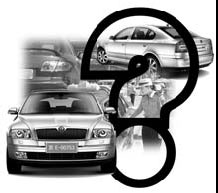Robin Williams once asked why it's called rush hour when nothing moves.
If he had visited Beijing recently, he would have found the answer on those four days when odd- and even-license plate cars took turns on the road, and traffic conditions and air quality improved dramatically - basically, when everything moved.

It was more like Rush Hour of the Jackie Chan/Chris Tucker variety - all action on the road.
The movie spawned at least two successful sequels, but most Beijing car owners are really only interested in one - during the Olympic Games next year.
The evident success of the car-reduction exercise led to predictable reactions, which were captured in a recent poll: Car owners, finding public transport uncomfortable and pedaling bicycles unfamiliar, want the experiment to remain just that.
Considering that car ownership costs (apart from the purchase price) 10,000-30,000 yuan ($1,300-3,900) a year in the form of taxes and insurance, people would justifiably be peeved if they were allowed to use their wheels only half the time.
But those who use public transport (the frequency of buses and trains increased significantly those four days) like the idea of having half the private cars off the road on any given day if it means they arrive at their destinations faster.
The media, sensing the popular mood - after all, most people don't own cars despite the oft-quoted figure of 1,000 cars being added to Beijing streets daily - commented that the car-reduction scheme has to be a long-term project rather than a one- or two-off.
Margaret Thatcher famously said that standing in the middle of the road is very dangerous: you risk getting knocked down by the traffic from both sides. But there is one middle path that I am familiar with - in Singapore.
For the edification of readers not familiar with the island state's traffic controls: It now costs about $8,000 to buy a piece of paper that entitles you to buy a car. The price (which used to be much higher some years ago) is set by bids for a fixed number of cars to be released on the road every month.
Then, a device placed in the car deducts a toll every time the car enters the business district.
There are also weekend cars, which can be used at night or on the weekend, for a much lower license fee.
Should Beijing, or any Chinese city, wish to adopt the model, it would limit the increase in the number of cars - while letting the market set the price of car ownership - and at the same time allow residents to have weekend family getaways at a lower price. At the same time, a premium could be imposed on people entering high-traffic areas.

The four-day traffic- and air-control exercise was seen as only a means to one end - a successful Olympics.
There is little doubt that various government measures will ensure a Games mostly free of traffic congestion and pollution, but those of us who live in Beijing, before and after the Games, deserve better, and for longer.
The solution, according to most media commentary and public opinion polls, is better public transport. After all, millionaire bankers and traders in London or central Hong Kong readily use public transport.
And Beijing's huge mass transit infrastructure program could at least reduce the number of traffic jams we see now.
As Robin Williams' character in the film Bicentennial Man said in response to the old riddle of why the chicken crossed the road: Because there is no traffic.
Email: ravi@chinadaily.com.cn
(China Daily 08/29/2007 page10)